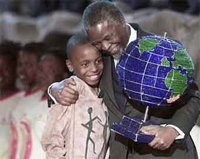 The Earth Summit opens on Monday in Johannesburg, giving world governments driven by a mix of idealism and realpolitik just 10 days to agree on ways to haul millions out of poverty without poisoning the planet.
The Earth Summit opens on Monday in Johannesburg, giving world governments driven by a mix of idealism and realpolitik just 10 days to agree on ways to haul millions out of poverty without poisoning the planet.
Their host, South African President Thabo Mbeki, called on Sunday for an end to "global apartheid" between a rich minority of prosperous consumers and the mass of suffering poor.
As the summit formally begins Monday, Nelson Mandela, who led black South Africans to freedom from white minority rule, will address some of the tens of thousands of campaigners who have arrived in Johannesburg to lobby their leaders.
At the same time, Mbeki and senior United Nations officials will open the official meeting at 10 a.m. (4 a.m. EDT) in the marble-lined halls of the plush Sandton convention center.
Shielded there by ranks of police from demonstrators and sprawling, crime-ridden slums, officials made scant progress over the weekend in bridging a wide gulf between hesitant rich states and poor nations demanding more aid and fairer trade.
"Everybody is very pessimistic," one Italian delegate said.
Ministers start talks Monday and world leaders -- minus notable absentees like US President Bush -- are due in Johannesburg for a day or two next week.
Protesters accuse the United States and European Union of pushing the interests of globalized big business at the expense of the very poor. Some activists have already confronted police, who clamped down hard and have warned they will not tolerate the kind of mayhem seen at summits in Seattle, Genoa and elsewhere.
At a colorful opening ceremony Sunday, Mbeki recalled the solidarity that helped overcome apartheid in 1994: "This is a world in which a rich minority enjoys unprecedented levels of consumption, comfort and prosperity while a poor majority enjoys daily hardship, suffering, dehumanization," he said.
"Our common and decisive victory against domestic apartheid confirms that you, the peoples of the world, have both a responsibility and a possibility to achieve a decisive victory against global apartheid."
BUSH ABSENT
One key goal, already adopted by the United Nations two years ago, is to halve the proportion of the world's population, currently 1.2 billion people, who live on less than a dollar a day -- the average European enjoys about 60 times that.
Now it is up to ministers to push the negotiations forward before heads of state arrive for the finale of the World Summit on Sustainable Development. They hope to sign off on a wide-ranging package of measures ranging from providing clean water supplies and saving fish stocks to fighting AIDS.
Bush, however, is not coming, provoking critics to question the commitment of the global superpower and biggest polluter to the green agenda first agreed at Rio de Janeiro 10 years ago.
Bush is too busy dealing with security problems in the wake of last September 11 and with the economy, U.S. officials say.
Washington is leading resistance to demands from developing countries for concrete commitments to higher aid payments and more access to Western import markets but says it is keen to promote worthy projects in partnership with private enterprise.
WORLDS APART?
Though not a legally binding treaty, the UN organizers hope that pledges entered into so publicly by world leaders can revive a drive for environmentally friendly economic growth that was launched 10 years at the first Earth Summit in Rio.
Most of those promises, designed to bring prosperity to poor regions like Africa without causing the ecological damage created by industrialization in the West, remain unfulfilled.
Richer nations complain that much of their aid has been squandered by corrupt or incompetent governments in the Third World and are demanding better guarantees of good governance.
The summit will concentrate the work of its thousands of official delegates on five key areas -- cleaner water, non-polluting energy, better health, sustainable agriculture and preserving the "biodiversity" of the Earth's many species.
Healthcare is on the agenda for plenary talks Monday, with delegates keen to underscore how poor health causes poverty and poverty means a lack of adequate medical care for billions.
One South African in nine suffers from HIV/AIDS, which has ravaged much of the continent, decimating the active workforce and leaving millions of children without parents.
Mandela himself, described for the first time how he has been personally affected, losing close relatives to the disease.
He told South Africa's Sunday Times newspaper he had lost a 22-year-old niece and two sons of a nephew who was very close to him: "We call upon everybody not to treat people who are HIV positive with stigma. We must embrace and love them."
Some of Johannesburg's poor questioned, however, how much real will there was on the part of the rich world to help them.
"They spent thousands preparing for the summit to improve a place that is already good," street vendor Wilson Mathebula said in the shanty township of Alexandra, on a hill above the summit.
"What about us here? It's wrong all that money and glamour just at our doorstep -- they don't even know that we are here."
(China Daily August 26, 2002)
|

